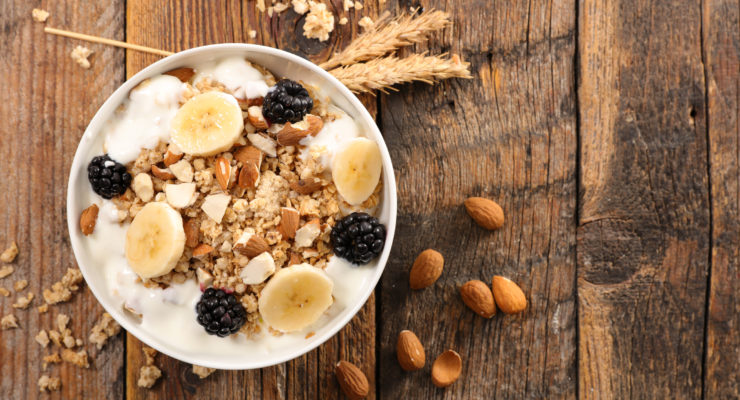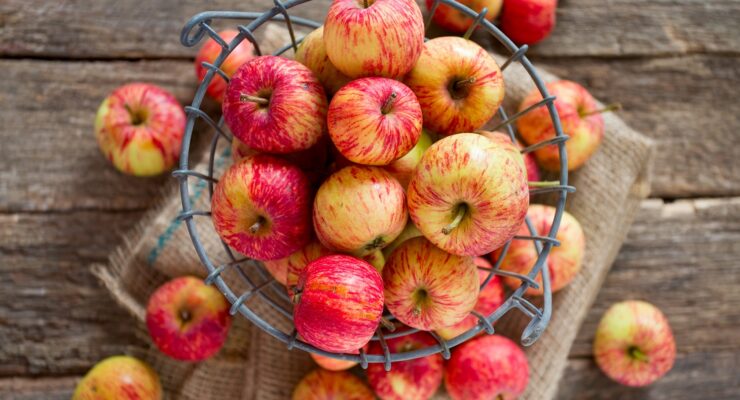8 Foods to Support Your Immune System All Year Round
Article posted in: Diet & Nutrition
The stronger your immune system, the more fun you can have all year. You can weather the storm of a winter stomach bug, beat back an autumn chill or fend off those inconvenient spring or summer sniffles to maximize your sunshine fun. Washing your hands and avoiding coworkers who are sick can reduce your risk of catching all these nasties. However, there are still germs all around us. That’s where your immune system comes in. You can keep your immune system in top shape with many of the behaviors that support general health.
Getting seven to eight hours of quality sleep each night, staying hydrated and exercising all promote your sickness-stopping powers. A healthy diet filled with nutritious foods can also provide major immune support. Stay healthy and ward off sickness with these science-backed, Nutrisystem-approved foods that have been shown to boost immunity.
Here are eight healthy foods to support your immune system all year round:
1. Organic Fruits and Veggies of All Kinds

Are organic foods worth the extra price? When it comes to immunity, the answer may be yes. According to a review of 343 different studies, published in the British Journal of Nutrition, scientists found that organic foods had antioxidant content that was 19 to 69 percent higher than non-organic crops. Antioxidants ward off cancer and other diseases. They also reduce inflammation which may support the immune system.
How to eat them: If you’re worried about the price of organics, focus on the foods known as “The Dirty Dozen.” These fruits and veggies are the most susceptible to pesticide residue, so buying them organic will give you the most health bang for your buck. Click here for the dirt on The Dirty Dozen!
2. Fatty Fish

You’ve probably heard that eating fatty fishes like salmon provides Omega-3 fatty acids that can protect against heart disease, according to Medical News Today. However, these water-borne superfoods are also one of the most potent food sources of vitamin D, says the National Institutes of Health Office of Dietary Supplements. Vitamin D not only activates calcium for stronger bones but also helps to support immune function. In fact, when you don’t get enough vitamin D—like an estimated 42 percent of Americans—you’re at a higher risk of getting the cold or flu, says The Harvard Gazette.
How to eat it: Try this easy-to-prepare salmon burger with herb cream sauce or one of these other simple salmon recipes from The Leaf!
3. Goji Berries

These little red jewels are one of the most nutrient-dense fruits in the world. They’ve got more than double the immunity-boosting antioxidants of blueberries. They can even help protect your eyes from age-related decline. According to a study, published in Optometry and Vision Science, participants who ate goji berries for 90 days increased levels of plasma zeaxanthin, an antioxidant that supports vision. They’ll also help you feel full: Gojis have four grams of protein, over three grams of fiber and 98-calories in a five-tablespoon serving, says NutritionValue.org.
How to eat it: You can just munch ‘em! They are also great sprinkled on smoothie bowels, oatmeal and yogurt. If you’re looking for a little more variety in your trail mix, try adding gojis instead of raisins with unsalted nuts or seeds.
4. Yogurt

It’s alive! And that could keep you healthy: The active cultures or living bacteria in yogurt can help keep your intestinal tract clear of germs that cause disease. In a study, published in Annals of Nutrition and Metabolism, women who ate seven ounces of yogurt per day for two weeks boosted their immune functions and increased their white blood cell counts. And it didn’t have to be fancy yogurt with “probiotic” on the packaging: That kind had similar effects to regular yogurt.
How to eat it: Not just for breakfast! The Leaf’s yogurt parfaits, like this chocolate-and-banana Chunky Monkey or this delicious Berry Delight are a great way to treat yourself and your immune system!
5. Garlic

Your breath might stink but you won’t be sick! When scientists gave people either a placebo or garlic extract containing allicin (a chemical found in raw garlic), the garlic group had fewer colds over 12 weeks than the placebo group, says the Avicenna Journal of Phytomedicine. It may also help in the long term: According to ScienceDaily, garlic may reduce the amount of plaque that builds up in the arteries.
How to eat it: To get the cold-fighting properties, you’ll need to have the garlic raw—allicin dissipates when garlic is cooked, says Anti-Cancer Agents in Medicinal Chemistry. Try it as a pizza topper, or in this flavor-packed Mexican Street Corn Dip!
6. Sauerkraut

Like yogurt, sauerkraut and other fermented foods contain probiotics or “good bacteria” that can keep your digestive system balanced. However, according to Current Opinion in Gastroenterology, studies have found that they could also help with diseases related to the immune system, like eczema, as well as reduce the severity of allergies. So, pile it on!
How to eat it: Top your burgers with kimchi, sauerkraut or other fermented options for a low-calorie, immunity-boosting crunch. Learn more about fermented vegetables here!
7. Bell Peppers

It’s not just an old wives’ tale: vitamin C really does help keep upper respiratory infections, like colds, at bay. A 2017 research review, published in Nutrients, found that vitamin C can decrease the risk of respiratory and systemic infections. You can get vitamin C from more than just orange juice. One cup of bell pepper slices has 100 percent of the recommended daily vitamin C for an adult woman, says the United States Department of Agriculture (USDA).
How to eat it: While watching TV, reading the news, or on the side of your sandwich at lunch. Crunchy, sweet bell peppers are an easy way to get towards your four daily servings of non-starchy vegetables for maximum weight loss success.
8. Lean Beef

Wait, wait, wait: Isn’t red meat supposed to be bad for you? Eating too much of it has been associated with increased risks of heart disease and cancer. However, beef is also one of the most potent providers of zinc in our diets. Zinc functions as an “intracellular signal molecule” for immune cells—that is, it tells them to get to work, helping to fend off colds, lower respiratory infections and other diseases, says Current Opinion in Clinical Nutrition and Metabolic Care.
How to eat it: You know the saying: It’s what’s for dinner. Try it in this easy, healthy slow cooker Beef Stroganoff.











